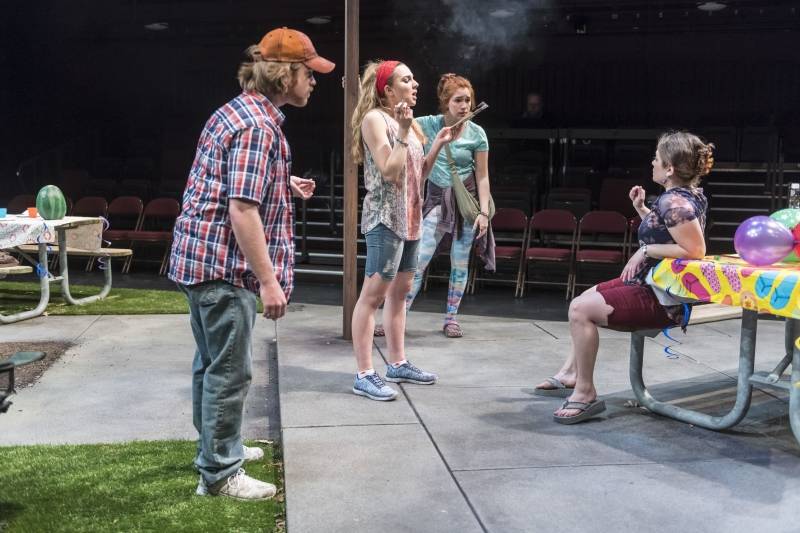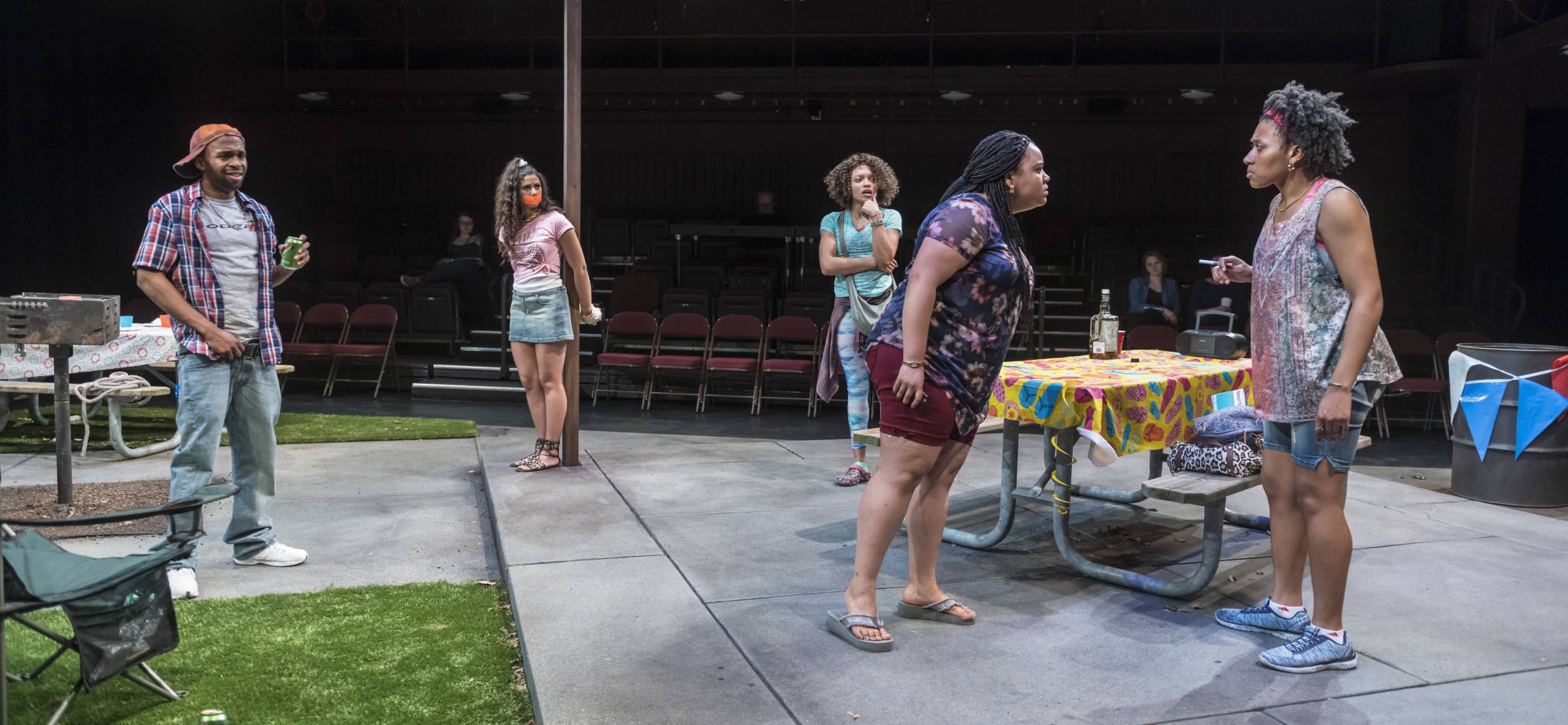Robert O’Hara’s Barbecue tells the story of a family’s confrontation of one of their siblings about her drug use. And that may sound like a very heavy and emotionally dense play, but the sort of rag tag, brazen characters (with many vices themselves) allow for plenty of moments of comedy. More importantly, the structure of the narrative keeps you wondering about what exactly is going on with this story. Throughout the first act, we are introduced to a family setting up a park pavilion in preparation for their sister’s intervention. Periodically, however, the lights shift, music plays, and an entirely new cast “taps in” and carries on the scene—only this other cast is entirely African American. It makes for a thought provoking first act, as you sit and contemplate what message the play is trying to get across and the ways in with race might affect the story. Without spoiling anything, I’ll just say that it in the final moments of the first act, we start to understand more about what exactly is going on. There is sudden transition into intermission that is surprising, illuminating, and honestly magical. The second act then explores that “big reveal.”
Illinois Theatre’s production of Barbecue, directed by Chuck Smith, was engaging and comical, while also bringing up some questions about how we live, how we consume media, and how we confront issues of alcoholism and drug abuse in our country.
As you enter the Studio Theater, the space is set up in an alley style seating, with audience banks on two sides of a narrow strip of stage filled with picnic tables and the impression of a wooden pavilion structure. I loved the choice of the alley style seating as it allowed me to see the faces of audience members across the way, and I saw a couple of women really enjoying the character of Adlean. What I particularly enjoyed about J. Michael Griggs’ scenic design was the details: the grass, the bits of leaves under one table, and the smoke that came off the park grill when someone flipped a burger patty. Those perfect subtle touches helped complete the picture on stage.

As I mentioned, there were essentially two casts of the same characters, and while there was talent across the board, I naturally found some to stand out more than others. I found Marlene Slaughter’s drug addicted, alcoholic Marie to be one of the best performances of the evening. I admit that I was a fan of hers before this, having seen her in other productions, but my admiration was confirmed. She has a presence and magnitude on stage that is hard to look away from. Additionally, Tafadzwa Diener was commanding and appropriately aggravating for her controlling older sister role of Lillie Anne. Her counterpart, Elana Weiner-Kaplow, who played Lillie Anne in the other cast, was also excellent in the role, which teetered between sympathetic (as her goal was to get her sister to rehab) and annoying (as her tactics were not always as innocent as her goal). Finally, Jordan Gleaves and Patrick Weber brought to the stage James T, whose very apparent beer drinking and weed smoking throughout the show subtly suggests that not everyone needs to be hitting the hard stuff to have a problem.
 The lighting and sound elements were also crucial to telling this story, both in the transitions and the final moments of the second act. Heather Raynie’s lighting design allowed us to see transitions between casts through flashes of purple and pink; the use of bright and brilliant color in some ways adding to the mystery and magic of these transitions. The final moments of the second act are a nod to the (overly white) Oscar awards, and that scene would be nothing without Raynie’s use of lighting and David M. Greenberg’s use of sound to set the stage and take us through the scene.
The lighting and sound elements were also crucial to telling this story, both in the transitions and the final moments of the second act. Heather Raynie’s lighting design allowed us to see transitions between casts through flashes of purple and pink; the use of bright and brilliant color in some ways adding to the mystery and magic of these transitions. The final moments of the second act are a nod to the (overly white) Oscar awards, and that scene would be nothing without Raynie’s use of lighting and David M. Greenberg’s use of sound to set the stage and take us through the scene.
While it might not make much sense, what I like most about this play is perhaps what I also like the least. It brings up and presents a variety of themes—drug addiction, alcoholism, race, opioids, representation in films, that fact that you don’t have to be addicted to meth to be a drug addict, the fact that reality t.v. does not often reflect reality, and the overarching idea of what the truth is and if it’s really important or not—but in doing so, it also glides past some of these themes without fully digging into them and confronting them head on. So while I enjoy that this play was able to bring up issues that are so relevant to society today—and in a way that has left me thinking about it ever since—I still wish that they had been fleshed out just a little more, and that the conversation around them was a bit more complete.
Overall, this production did an excellent job of balancing these many issues with moments of levity. I would recommend this play to anyone looking for evening of entertainment that also provides you with questions you will be pondering for days.
________________________________________________________________________
Barbecue, directed by Chuck Smith, will be playing at the Studio Theater at the Krannert Center for Peforming Arts until April 8th. Click here for more details.
Photos by Darrell Hoemann.








